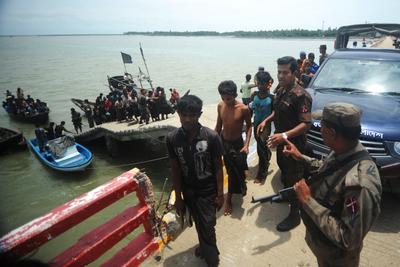Though official bilateral relations between these two countries began in 1972, when the government of Myanmar recognised Bangladesh as a sovereign state, they have failed to establish a smooth and friendly bilateral relationship in the intervening four decades. Perhaps the main reason holding back bilateral relations has been Myanmar’s determination to stay in China’s good books, which has meant that the government of Myanmar has not shown enough respect for its small neighbour. Over the years, they have tried to take advantage of Bangladesh’s geographical vulnerability and refused to solve existing disputes.
Other issues that have hindered the process of building effective bilateral relations include the influx of Rohingya refugees, demarcation of land and maritime boundaries, illegal trafficking, and alleged cross-border movement of insurgents.
Rohingyas have been fleeing to Bangladesh from Myanmar since 1978, when around 200,000 members of this Muslim ethnic group escaped the Myanmar army’s operation Nagamin Sit Sin Yay (Dragon King). Later on, between 1991 and 1992, almost 250,000 Rohingyas fled to Bangladesh to escape persecution. The most recent incident took place in June 2012, when a large number of Rohingyas tried to enter Bangladesh after riots pitted Buddhists against Muslims in Myanmar’s state of Rakhine. This time, however, the government of Bangladesh has refused to accept any Rohingyas.
The ongoing conflict about demarcation of land and maritime boundaries has been resolved through a 2012 verdict of the International Tribunal for the Law of the Sea, which granted Bangladesh over 111,000 square kilometres of exclusive economic zone waters in the Bay of Bengal, and 12 nautical miles of territorial sea around St. Martin’s Island. It is expected that the government of Myanmar will show its full commitment to implementing this judgment, which will assist in resolving a long-standing dispute between the two neighbouring states. Other issues, including illegal trafficking and cross-border movement of people, may be resolved through continuous dialogue between both countries.
Despite these sources of discontent and dispute, Bangladesh and Myanmar are progressing toward effective bilateral relations. The prime minister of Bangladesh, Sheikh Hasina, visited Myanmar immediately after the visit of US Secretary of State Hillary Clinton in late 2011. The prime minister’s visit is more than a positive sign: it has brought about concrete outcomes, including the signing of two important agreements.
The first is an agreement on the establishment of a joint commission for bilateral cooperation between the two governments; the second is a memorandum of understanding to establish a joint business council between the Myanmar Federation of Chambers of Commerce and Industry, and its Bangladeshi counterpart.
Meanwhile, the president of Myanmar, Thein Sein, is expected to visit Bangladesh in the near future to discuss the situation of refugees on the border between the two countries. His visit was originally scheduled for 15 July 2012 but was postponed after news of sectarian unrest in Rakhine broke out last June. It is expected that the new date will be announced soon.
After taking over the presidency of Myanmar in March 2011, former general Thein Sein has taken a series of initiatives that have been considered pro-democratic. The new wave of political reforms bears good tidings for the bilateral relationship between the two neighbouring states. The journey toward effective bilateral relations was inaugurated by the heads of state late last year. It is now time for their respective bureaucracies to accelerate the process of building the smooth and friendly bilateral relationship that is essential to guarantee peace and stability in the region.
Pranab Kumar Panday is Visiting Fulbright Fellow at the Department of Development Sociology, Cornell University, and Professor at the Department of Public Administration, Rajshahi University, Bangladesh.


Dr. Panday has done an excellent analysis of Bangladesh-Myanmar Relations. Congratulations!